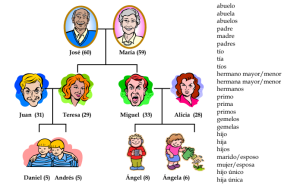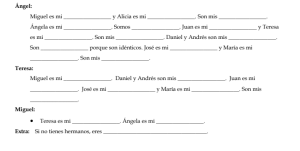30
¿Tienes hermanos?


Exercises A
Ej. 1 Contesta las preguntas según el árbol familiar.
- ¿Cómo se llaman los padres de Miguel? ¿Cuántos años tienen?
- ¿Cómo se llama la hermana de Ángel? ¿Cuántos años tiene?
- ¿Cómo se llaman los primos de Ángel? ¿Cuántos años tienen?
- ¿Cómo se llama el marido de María? ¿Cuántos años tiene?
- ¿Cómo se llama la mujer de Juan? ¿Cuántos años tiene?
Grammar
A. Important Verbs
You need to know the full conjugations of the following verbs when talking about people. Learn them all by heart. You have already come across a few of them.
|
|
llamarse (to be called) |
ser (to be) |
tener (to have) |
|
yo (I) |
me llamo |
soy |
tengo |
|
tú (you – informal) |
te llamas |
eres |
tienes |
|
él/ella/usted (he/she/you – formal) |
se llama |
es |
tiene |
|
nosotros/as (we) |
nos llamamos |
somos |
tenemos |
|
vosotros/as (you all – informal) |
os llamáis |
sois |
tenéis |
|
ellos/ellas/ustedes (they/you all – formal) |
se llaman |
son |
tienen |
B. Family Nouns
In Spanish, when a group comprises both males and females, we use the masculine plural form eg: hermanos means brothers as well as siblings, tíos means uncles as well as aunts and uncles.
C. Possession
Spanish does not have an ‘apostrophe s’ to indicate possession. Instead it uses ‘de + noun’.
eg: Ana´s father = the father of Ana → el padre de Ana.
the teacher´s books = the books of the teacher → los libros del profesor (NB de + el = del)
D. Possessive Adjectives
These agree with the noun they describe (the possession), rather than the gender of the possessor.
| masculine singular | feminine singular | masculine plural | feminine plural | |
| my | mi | mi | mis | mis |
| your (informal – 1 owner)) | tu | tu | tus | tus |
| his/her/their/your (formal) | su | su | sus | sus |
| our | nuestro | nuestra | nuestros | nuestras |
| your (informal – 2 + owners) | vuestro | vuestra | vuestros | vuestras |
Because su(s) have multiple meanings, clarification may be required. If clarification is necessary, su or sus may be replaced as follows:
su padre: el padre de él, …de ella, … de Ud., …de ellos, …de ellas, …de Uds.
sus padres: los padres de él, …de ella, … de Ud., …de ellos, …de ellas, …de Uds.
Exercises B
Ej. 2 Mira el dibujo. ¿Qué dice cada persona? eg: Es mi tío, Son mis primos, Soy…

Ej. 3 Rewrite the POSSESSIVE ADJECTIVE in brackets so that it agrees with the noun next to it.
- (mi) ______ tíos
- (tu) ______ familia
- (su) ______ bolígrafo
- (su) ______ amigas
- (tu) ______ papeles
- (su) ______ padres
- (su) ______ mesa
- (mi) ______ prima
- (nuestro) ______ hijo
- (nuestro) ______ madre
- (vuestro) ______ estuches
- (vuestro) ______ reglas
Ej 4 Fill in the blanks with the correct possessive adjectives.
- ¿Cómo se llama ______ hermano, Andrés? ______ hermano se llama Daniel.
- Su hermana se llama Laura y ______ hermanos se llaman Juan y Carlos.
- Paco tiene tres hermanos. ______ hermano se llama Ángel y ______ hermanas se llaman Isabel y Maricarmen.
- ¡Hola! Me llamo María. ______ padres se llaman Pedro y Carmen.
- ¿Cuál es ______ nacionalidad, Ángela? Soy inglesa, pero ______ padre es español.
- Ana es de Italia y ______ madre es de Irlanda.
- En ______ familia somos ______ padres y yo. No tengo hermanos.
Ej 5 Translate into Spanish
- your (formal, singular) books
- our pens
- my pencil
- his ruler
- My father´s brother. (the brother of my father)
- Their daughter´s friends.
- Paul´s cousin.
- Your sister´s bag.